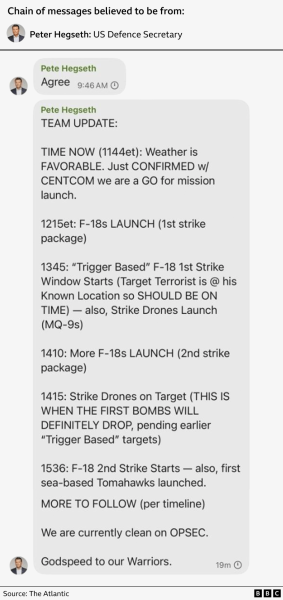On March 24, 2025 an unprecedented news article on Trump’s Administration had made its undeniable presence as it soon embarked on its way to the top headlines. Jefferey Goldberg, the editor-in-chief of The Atlantic, published an article: “The Trump Administration Accidentally Texted Me Its War Plans.”
The war plans were sent through the messaging service, Signal. The group chat included prominent Trump Administration members, including Secretary of Defense Pete Hegseth, National Security Advisor Michael Waltz, Vice President JD Vance, CIA Director John Ratcliffe, and several more. According to Goldberg, Waltz had accidentally included him into the Signal group chat in which Hegseth began discussing “war plans” for bombing the Houthis in Yemen. Messages were sent to the journalist near “11:44 a.m.”, nearly two hours before such plans were revealed to the world.
The following text messages included specific times as to when the attack would occur, specific coordinates, people and places that were to be targeted in the operation, and as well as the specific weather in the area. Goldberg would later leave the group chat as top officials began to discuss highly confidential information within the Signal group chat. Many government officials have called for Pete Hegseth and Micheal Waltz’s resignation, with many concerned as to why such sensitive information was shared through an insecure messaging platform.

As the world further continues in the trek to advancements in technology, there has also be an increased threat surrounding the vulnerability of such sensitive information to cyber-crime organizations. In the White House’s 2024 “FISMA Annual Report”, there was a rise in the “number of cybersecurity events reported to federal agencies.” The report noted the growth in such events, highlighting it to be “nearly ten percent more” than the cybersecurity incidents reported in 2023. In the end, the total was found to be around 32,211. The report listed only 11 of the reported incidents, however three of those reports stood out from the rest.
1. Department of Justice:
On February 17, 2023, the U.S. Marshals Service had faced a significant security breach, with much of “The affected system contain[ing] law enforcement sensitive information, including returns from legal process, administrative information, and personally identifiable information pertaining to subjects of USMS investigations, third parties, and certain USMS employees.” There was later a “third party” that was brought onto the scene in order to hold an investigation surrounding ransomware attack.
2. Department of the Treasury:
Around 120,000 people has reported of an error within the Internal Revenue Service’s (IRS) website, with potential sensitive information of people’s “[n]ames” and “financial information” being posted. The private information was shared through the Form 990-T, covering many with “retirement accounts”. The incident was announced to have been caused by a “coding error”, however the IRS committed to continuing it’s review on the system.
3. Department of Health and Human Services (HHS):
The health department had been targeted by “fraudsters”, resulting in the department losing “millions of dollars”. The targets were aimed towards “Medicare and Medicaid” as the fake “healthcare providers” dubbed many in making fraudulent payments. Such payments exposed “Personally Identifiable Information (PII)” such as “dates of birth”, “bank account information”, and much more. Many of the threats were led by “email phishing and impersonation attacks” against those within the department.
Why is this happening?
According to U.S. immigration and Customs Enforcement, National Security “refers to our nation’s collective defense, intelligence, internal and external security, and foreign relations capabilities.” Senator Amy Klobuchar (D) spoke on the increasing threats facing the United States, stating, ” In an increasingly interconnected global economy with rapid advances in technology, America also faces new kinds of threats to our security—cyberattacks and disinformation operations, malign foreign influence campaigns, and coordinated efforts to damage our economy and harm our democracy.”
Republicans continued on the increasing cybersecurity threats, calling for “an urgent need for an adaptive cybersecurity posture.” Klobuchar stated how she believed that in order to combat this issue, the government needs to “focus [their] defense budget on retooling and reinforcing our military capabilities and rewarding those who have sacrificed for this nation, regardless of their service branch.”
This comes as a contrast to Republicans, who feel concerned for the current national security as they believe that “using overwhelming force is the best way to defeat” such threats to national security.
Overall, national security is an important aspect to the democratic form of government in the United States, and certain measures and precautions need to be taken in order to conserve this form of autonomy.














